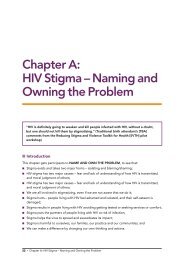Implementing Multiple Gender Strategies to Improve HIV and ... - ICRW
Implementing Multiple Gender Strategies to Improve HIV and ... - ICRW
Implementing Multiple Gender Strategies to Improve HIV and ... - ICRW
Create successful ePaper yourself
Turn your PDF publications into a flip-book with our unique Google optimized e-Paper software.
LESSONS LEARNED AND CHALLENGES<br />
Key Findings <strong>and</strong><br />
Lessons<br />
• TAI provides <strong>to</strong>ols that young men can use <strong>to</strong> access knowledge <strong>and</strong><br />
resources they need <strong>to</strong> talk about among themselves that they cannot<br />
discuss at home.<br />
• It is important <strong>to</strong> create ownership of the program <strong>and</strong> engage the<br />
young men themselves in its inception <strong>and</strong> implementation. In the<br />
“Action by Young Men” project (elements of which are being replicated<br />
in Shosholoza), the young men themselves came up with issues<br />
concerning violence against women that they wanted <strong>to</strong> prioritize.<br />
• Holding one large conference per year with all of the soccer teams <strong>to</strong><br />
share what they have accomplished helps young men feel like they are<br />
a part of something larger. Teams report back on what they are doing,<br />
<strong>and</strong> each is motivated <strong>to</strong> do more as they see the progress of other<br />
teams.<br />
Challenges <strong>and</strong><br />
Unforeseen<br />
Outcomes<br />
• There was a temporary backlash from parents who did not see the<br />
usefulness of the program. They did not see it as a program promoting<br />
safety, <strong>and</strong> one of the program staff was accosted by a boy’s father<br />
who felt the project had “emasculated” his son by encouraging him <strong>to</strong><br />
have only one partner. Parents needed <strong>to</strong> be involved in program<br />
efforts as well.<br />
• Parents became less knowledgeable than their children, which created<br />
a knowledge gap. In this way, the project changed power dynamics in<br />
families. To solve this problem, the project engaged parents in<br />
workshops, for which some parents wrote letters thanking the program<br />
officers.<br />
• Initially, because TAI was made up primarily of women who openly<br />
discuss sex <strong>and</strong> sexuality, which are taboo <strong>to</strong>pics, collaboration with<br />
the mostly male SAFA was challenging <strong>to</strong> establish. Once established,<br />
however, men’s involvement has been high.<br />
• SAFA members were supportive; however, the actual structure of<br />
SAFA <strong>and</strong> elected positions change. New members are elected<br />
regularly so the challenge is <strong>to</strong> constantly re-engage the newly elected<br />
SAFA leadership.<br />
• Politics is a challenge with community work. It is important <strong>to</strong> be in<br />
constant communication with community leaders <strong>and</strong> <strong>to</strong> avoid<br />
misunderst<strong>and</strong>ings. Having a ward council member on h<strong>and</strong> is useful.<br />
Recommendations<br />
for Replication<br />
The model/process is feasible for replication in other communities, but TAI<br />
itself is currently focusing on organizational consolidation rather than on<br />
expansion.<br />
137
















